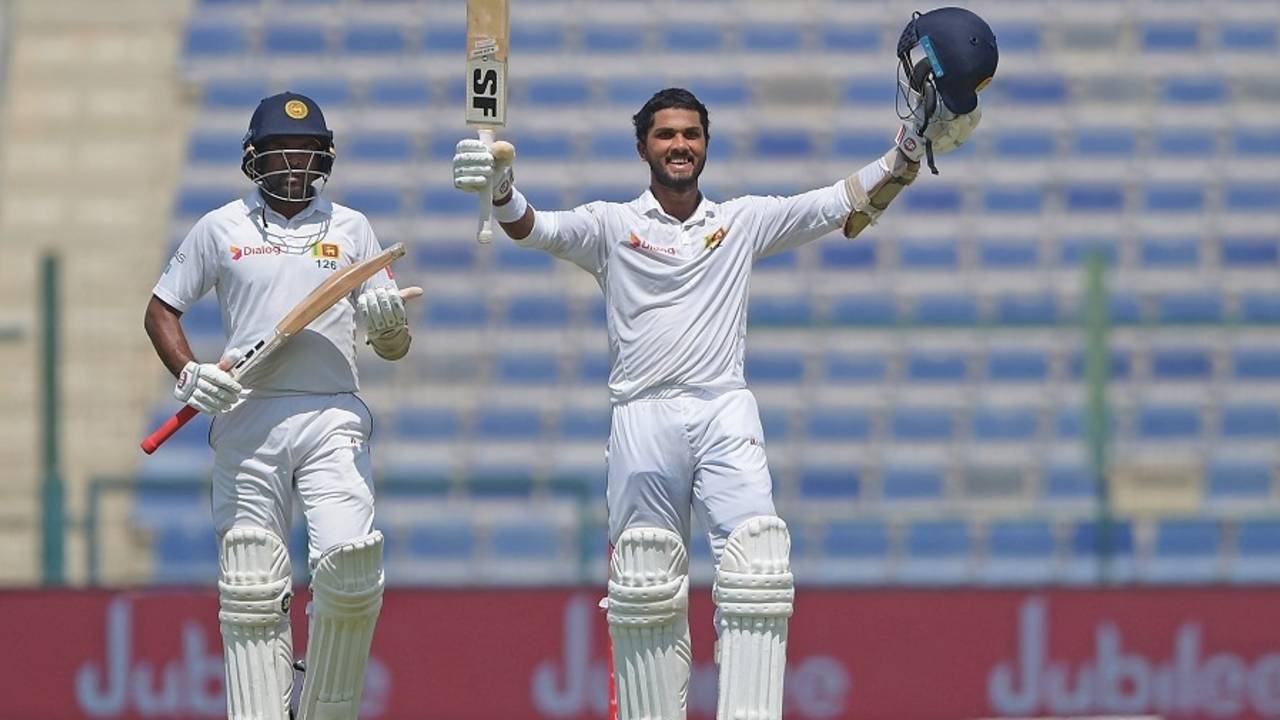Nine hours of captain Chandimal
This wasn't a madcap dash like his 169-ball 162 in Galle two years ago. It was, instead, a quiet epic, the innings of an extravagantly gifted batsman adapting to leadership
Osman Samiuddin in Abu Dhabi
Sep 29, 2017, 5:44 PM
Tom Dulat/Stringer
It's cruel, it really is. It's cruel for everyone else of their breed that they make it look so easy, that they swan in like this is exactly what they're supposed to do in this position and then they do it like it's no big thing. And not just like it's no big thing, but that it's a tiny thing and maybe the easiest of all things they'll do in a given day.
The pre-eminent batsmen of this age happen also to be captains of their sides. Whatever their merits as captain, look at the batsmen they are as captain. Virat Kohli averages 59.53 as captain, and 41.13 otherwise. Kane Williamson averages 59.94 as captain, and 49.23 otherwise. Joe Root, small as his sample is, averages 60.75 as captain, 52.80 otherwise. Steven Smith averages 69.02 as captain, 51.83 otherwise.
They haven't broken a collective bead of sweat between themselves in doing so either. It's superhuman and insane. If anything they've become, by numbers, better batsmen and in presence too they've grown. Which, if you think about it, goes against the very grain of human experience - normally the more pressure you apply upon humans, the more you begin to see what fragile constructions we are. It is not supposed to be easy, to be captain and to be the best batsman you can be. It's not mutually exclusive, but it takes some doing to be as good as a batsman as you were before captaincy, or even just the same kind of batsman.
It would only be natural, actually, for something to give way as a batsman when you take on the burdens of captaincy; not necessarily performance, but some little essence of what makes a batsman. Maybe a particular shot is put away. Maybe an innings just begins to creak a little under the weight of the role. In every single Misbah innings, as a recent example, it was clear that nearly every decision he made as a batsman, every shot he played, came only after he had weighed up every single beneficial or deleterious side effect on his captaincy and that in the shadow of so many shots Misbah did play was hidden a Misbah who wasn't captain who would've played that shot differently.
Smith, Kohli, Williamson and Root, by contrast, wear their captaincy so lightly on the batting crease, they hardly look like they're playing competitive cricket, let alone leading their countries.
Which brings us to Dinesh Chandimal and his quietly epic, nine-hour-long and unbeaten 155, a vivid illustration of what captaincy can - and by rights, should - do to most batsmen; which is, take a difficult, fraught task and add a level of neurosis to it. If you haven't followed Chandimal's career as closely as that of the big four, you might still remember him as one of a number of young and audacious batsmen who emerged in the subcontinent across the latter years of the aughts. Once upon a time, Sri Lanka had Dinesh Chandimal, because Pakistan had Umar Akmal and India had Kohli, and we had a golden age ahead of us.
It didn't work out that way but most likely, if you're asked, you'll recall Chandimal's 169-ball 162 against India a couple of years ago, a very different kind of epic and among the most memorable Test innings of recent years.
This is what you will definitely not recall from his innings spread over Thursday and Friday: that it took him 15 balls to get off the mark; that he got to double figures off his 52nd ball, that he was on 35 off 100 and then, surely set at that stage, still took 37 balls over his next three runs; that he ended yesterday 60 off 184 and it took him 273 balls and nearly six-and-a-half hours to get to his hundred. Not until deep into his innings today could anyone have been able to recall a shot of his, and when it did come it was something - a drive, on the up, wide of mid-off off Hasan Ali. A while later, a more expansive cover drive brought up the hundred, a release in so many ways.
Out of character? Maybe, though more like outside your expectations of him. Earlier this year he made 5 off 54 balls against Bangladesh (though he did make 50 off 75 in the second innings). A year ago he took nearly eight hours to make 132 against Australia. So if you thought he'd be that modern, all-shots attacker who only knows one mode, then no, clearly he isn't.
He isn't the rule and neither is he the exception, because there are others around who can scale back and grind one out. What this was for sure was a reminder that being a captain and extravagantly gifted batsman is not as easy as we have come to believe.
"Chandi is a leader," said his coach Nic Pothas and words can sound cheap, but these couldn't but help to have acquired some value in the aftermath of his innings. "He expects high standards from the team whether it is preparation or fielding or fitness. He sets a great example. We have worked on a few things on his batting and he is very happy that those things have come good. That was a great Test match innings."
The mark of a great batsman, Pothas added, is that they can adapt. Usually we take this to apply to conditions, or surfaces, or certain situations within a game. Not often enough anymore do we recognise that it means adapting to leadership itself.
Osman Samiuddin is a senior editor at ESPNcricinfo
